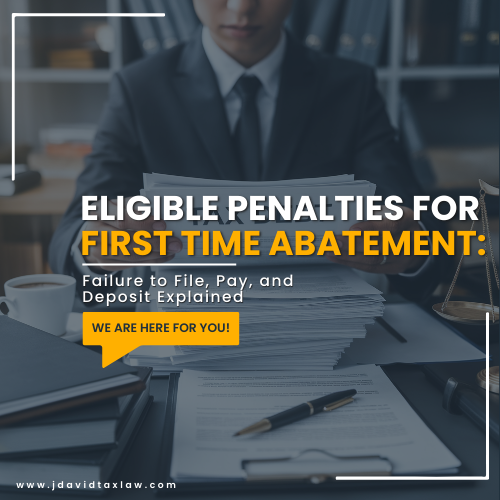In a July news release, the IRS made it official that it is changing how it audits big businesses by eliminating the Acknowledgement of Facts (AOF) Information Document Requests (IDRs) in 2026. It’s mainly to cut out the red tape that slows down operational execution. These updates are designed to speed up audits, reduce paperwork, and encourage faster resolutions.
That sounds like good news until you realize faster audits also mean less time to react. Whether you’re a large company or simply watching the direction the IRS is heading, it’s important to understand what’s shifting and how it could affect you.
The IRS is Forgiving Millions Each Day. You Could Be Next.
Key Takeaways
- The IRS is phasing out the Acknowledgment of Facts (AOF) process by 2026 to speed up audits.
- Accelerated Issue Resolution (AIR) lets taxpayers resolve issues once and apply them across all years.
- Fast Track Settlement (FTS) now has more oversight, reducing the chance of unfair denials.
- Faster audits mean less time to prepare, making record-keeping and early action more important.
- Small businesses should take note — IRS strategies tested on large corporations often become standard for everyone.
Understanding the Shift in IRS Strategy
The IRS wants to move away from long, drawn-out audits and toward faster, more focused examinations. These changes are part of a broader push to make the process more efficient for both the IRS and the businesses it audits.
At the center of this shift is a clear message that we hope is fulfilled: the IRS wants quicker resolutions, fewer delays, and a more collaborative process. For large companies, that means less paperwork and more opportunities to resolve issues early. For everyone else, it signals a change in how the IRS may handle audits moving forward.
These updates may start with large corporations, but the strategies being tested now often lay the groundwork for how audits are handled across the board. Businesses of all sizes should take note.
| Change | What It Means | Why It Matters |
|---|---|---|
| End of Acknowledgment of Facts (AOF) | AOF phased out by 2026, with optional use in 2025. | Fewer delays, less paperwork, and faster movement through audits. |
| Accelerated Issue Resolution (AIR) | Settle one issue and apply it across all audit years. | Reduces repeat disputes, cuts legal costs, and shortens audit cycles. |
| Fast Track Settlement (FTS) Oversight | Internal IRS review now required before denying FTS. | Fairer process, better chance of early resolution without court. |
| Shift Toward Speed | Audits becoming shorter and more focused. | Less time to prepare, higher stakes for record-keeping and planning. |
Say Goodbye to the Acknowledgment of Facts (AOF) Process
The IRS is phasing out the Acknowledgment of Facts (AOF) process by the end of 2025. For years, this step required businesses to confirm the IRS’s interpretation of key facts during an audit. In theory, it was meant to clarify issues. In practice, it often delayed resolution and added paperwork without improving outcomes.
Now, the IRS is giving businesses the option to skip it altogether. Starting in 2026, AOF will be removed entirely from the audit process. Until then, companies can choose whether or not to use it.
For businesses currently under audit, this change creates an opportunity to reduce unnecessary steps and move through the process more efficiently.
Use Accelerated Issue Resolution (AIR) to Resolve More, Faster
The IRS is expanding its use of Accelerated Issue Resolution, or AIR, in large corporate audits. This process allows corporate taxpayers to settle a tax issue once and apply that resolution across all relevant years in the current audit cycle.
That might not sound like a big shift, but it is. Under the old approach, a company could settle a deduction dispute for one year, only to argue the exact same point for the next. With AIR, the agreement carries over, which means fewer repeat negotiations and shorter audit timelines.
This change brings more clarity and less back-and-forth. For companies facing multi-year audits, it can also reduce legal costs and stress.
IRS Adds Oversight to Fast Track Settlement Denials
Fast Track Settlement (FTS) gives businesses a way to resolve disputes during an audit without going to court. It’s meant to save time, reduce conflict, and help both sides find common ground early.
The problem was that FTS requests could be denied too easily. Some were rejected without much explanation or oversight. That’s now changing.
Under the new rules, IRS teams must go through additional internal reviews before they can deny a taxpayer’s request for Fast Track. This added step makes it harder for FTS to be blocked without reason and gives businesses a better shot at a faster resolution.
What About Individuals and Small Businesses Facing Audits?
These updates are aimed at large corporations, but the IRS doesn’t keep its audit strategies in separate lanes. What starts in one division often becomes the model for others.
Faster processes mean less time to prepare. If you or your business gets audited, the window to respond, gather records, or settle disputes may be tighter than ever. What used to take months could move faster, with fewer chances to slow things down or correct mistakes after the fact.
Whether you run a large company or a small business, the key takeaway is the same: be prepared. Know your numbers, keep clean records, and don’t wait until the IRS is at your door to get legal help.
Pro Tip: Keep Records Audit-Ready
Don’t wait until you get an IRS notice to organize your paperwork. Keep records up-to-date year-round so you can respond quickly when audits move faster.
Don’t Let an Audit Get Away From You
Audits are moving faster, and the IRS isn’t waiting around. It shouldn’t matter if you’re already under review or concerned about your exposure; what you do early in the process makes all the difference.
J. David Tax Law helps businesses respond to IRS audits with confidence. Our attorneys focus solely on IRS and state tax matters, so we know how to protect your interests and guide you through every step of the audit process.
Pro Tip: Act Early in the Audit
The sooner you engage tax professionals in an audit, the more options you have. Waiting until disputes escalate reduces your chances for a fast, favorable resolution.
FAQs About The IRS Audit Process Changes in 2025–2026
What is the IRS Acknowledgment of Facts (AOF) and why is it being phased out?
What does the IRS Accelerated Issue Resolution (AIR) process do?
AIR lets businesses settle one tax issue and apply the result across all audit years. This helps shorten audit cycles and avoid repeat disputes. J. David Tax Law, a seasoned tax attorney firm, can help you with its IRS audit representation service for a hassle-free resolution process.



















